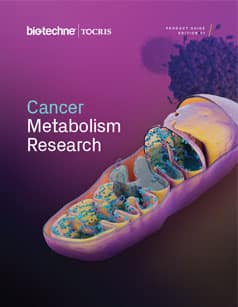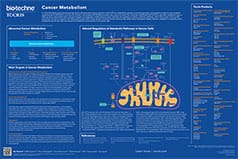HMG-CoA Reductase
3-hydroxy-3-methyl-glutaryl-CoA reductase (HMG-CoA reductase) catalyzes the rate limiting step in cholesterol biosynthesis - conversion of 3-hydroxy-3-methyl-glutaryl-CoA to mevalonic acid. HMG-CoA reductase is a transmembrane enzyme, bound to endoplasmic reticulum.
HMG-CoA Reductase Inhibitors |
|
|---|---|
| Cat. No. | Product Name / Activity |
| 3309 | Fluvastatin sodium |
| Potent HMG-CoA reductase inhibitor | |
| 1530 | Lovastatin |
| Potent HMG-CoA reductase inhibitor | |
| 4942 | Pitavastatin calcium |
| HMG-CoA reductase inhibitor | |
| 2318 | Pravastatin sodium salt |
| HMG-CoA reductase inhibitor | |
| 6343 | Rosuvastatin calcium |
| Potent HMG-CoA reductase inhibitor | |
| 1965 | Simvastatin |
| HMG-CoA reductase inhibitor | |
Other |
|
| Cat. No. | Product Name / Activity |
| 2969 | SR 12813 |
| Enhances HMG-CoA reductase degradation. Also PXR agonist | |
3-hydroxy-3-methyl-glutaryl-CoA reductase (HMG-CoA reductase) catalyzes the rate limiting step in cholesterol biosynthesis - the conversion of 3-hydroxy-3-methyl-glutaryl-CoA into mevalonic acid. This transmembrane enzyme is bound to the endoplasmic reticulum and is ubiquitously expressed.
When cholesterol levels falls, HMG-CoA reductase is transcriptionally upregulated by sterol regulatory element binding protein (SREBP), which binds to the sterol regulatory element (SRE) in the 5' region of the HMG-CoA gene. When cholesterol levels are elevated, short-term regulation of HMG-CoA is mediated by Ser872 phosphorylation by AMP-activated protein kinase and long-term regulation is mediated by the increased sensitivity of this enzyme to proteolytic breakdown. HMG-CoA reductase is the pharmalogical target for statins and the human gene encoding this enzyme is localized to 5q13.3-q14.
External sources of pharmacological information for HMG-CoA Reductase :
Literature for HMG-CoA Reductase
Tocris offers the following scientific literature for HMG-CoA Reductase to showcase our products. We invite you to request* your copy today!
*Please note that Tocris will only send literature to established scientific business / institute addresses.
Cancer Metabolism Research Product Guide
This product guide reviews some of the main areas in cancer metabolism research and lists around 150 products that can be used to investigate metabolic pathways in cancer including:
- Glycolysis
- Tricarboxylic Acid Cycle
- Lipidogenesis
- 1C Metabolism and Nucleic Acid Synthesis
- Drivers of Metabolic Reprogramming
- pH and Redox Balance
Cancer Metabolism Poster
This poster summarizes the main metabolic pathways in cancer cells and highlights potential targets for cancer therapeutics. Genetic changes and epigenetic modifications in cancer cells alter the regulation of cellular metabolic pathways providing potential cancer therapeutic targets.

